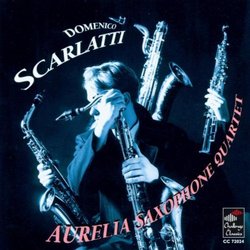| All Artists: Domenico Scarlatti, Aurelia Saxophone Quartet, Wilke te Brummelstroete Title: Domenico Scarlatti Members Wishing: 0 Total Copies: 0 Label: Challenge Classics Release Date: 9/16/2003 Album Type: Import Genres: Special Interest, Pop, Classical Styles: Vocal Pop, Chamber Music, Forms & Genres, Sonatas, Historical Periods, Baroque (c.1600-1750), Classical (c.1770-1830) Number of Discs: 1 SwapaCD Credits: 1 UPC: 608917202427 |
Search - Domenico Scarlatti, Aurelia Saxophone Quartet, Wilke te Brummelstroete :: Domenico Scarlatti
 | Domenico Scarlatti, Aurelia Saxophone Quartet, Wilke te Brummelstroete Domenico Scarlatti Genres: Special Interest, Pop, Classical
|
Larger Image |
CD Details |
CD ReviewsImprobable, but it works Eloi | Ely, NV USA | 05/17/2005 (5 out of 5 stars) "I disagree with the band or its producer--purely keyboard works like the opener, K 159 (probably Scarlatti's most often-played work--why?), K 517 and K 519, sound awful on winds in this recording. Yet #2, K 181 in A major, works well, and #3, the Cat's Fugue, is the best performance I have ever heard of K 30. It has an authentic fake story to keep it in the repertory--too bad, since it always seemed the weakest work in the Essercizi. Aurelia makes it work, and every keyboard performance on harpsichord, organ, piano falls before this wonderful realization. No keyboard player could bring off the massive ritardando at the conclusion as these guys do!
Other gems include a brisk rendition of K 450 and a new way of hearing K 516. K 87 is draggy, but K 96, though inconsistent in tempo, works surprisingly well. Fans of the World Saxophone Quartet and other jazz groups will have to adjust to the symphonic sound here--think clarinet. I actually bought this recording to hear Wilke te Brummelstroete's voice, and she delivers a gorgeous, expressive performance of the brief chamber cantata Consolati e spera and the better-known Salve Regina. She's no clarinet, and her tight vibrato is especially well set off by the sax quartet, which becomes an organ in the Salve Regina. Even when the quartet sound doesn't fit the style of the sonatas they play, there's always the sense of real music questing. Sure, the instrumentation is not what Scarlatti had in mind, but there's none of the gimmickry of climbing Aconcagua on a skateboard here--these are musicians! " |

 Track Listings (14) - Disc #1
Track Listings (14) - Disc #1